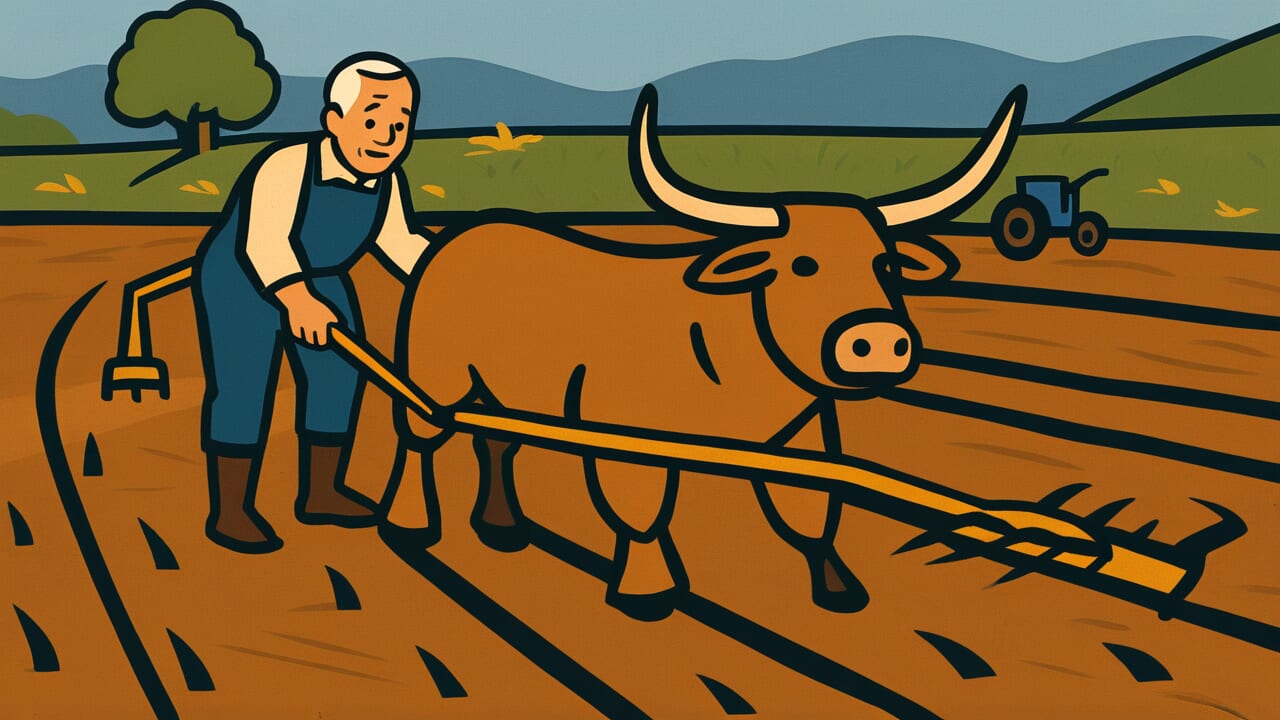How to Read “Using the deceased father’s halberd to sharpen an ox arrow”
Kofu no hoko wo motte gyūshi wo migasu
Meaning of “Using the deceased father’s halberd to sharpen an ox arrow”
This proverb means that attempting challenges beyond your abilities will not bring results. When someone without sufficient strength tackles difficult work with inadequate tools, they cannot achieve their goal.
In fact, such efforts end in waste. This saying serves as a warning against futile struggles.
People use this proverb when advising someone who tries to take on tasks clearly beyond their capacity without understanding their own abilities or position. It helps them regain perspective.
You can also use it when reflecting on your own actions. It reminds you to distinguish what you can and cannot do right now.
The reason for using this expression is not simply to say “it’s impossible.” Rather, it uses a concrete metaphor to clearly explain why a particular challenge is difficult.
Even today, many situations involve gaps between self-assessment and reality. This proverb teaches the importance of avoiding reckless challenges and first building up your strength.
Origin and Etymology
This proverb is believed to come from ancient Chinese classics. “Kofu” refers to a weak father. “Hoko” is a type of ancient Chinese weapon shaped like a spear.
“Gyūshi” means an arrowhead made by carving ox horn. “Migasu” means to polish or sharpen.
Looking at the structure of the phrase, it depicts a weak father trying to polish hard ox horn with an old weapon. Ox horn is extremely hard and requires considerable strength and proper tools to polish.
However, a weak person with inadequate tools cannot achieve the desired result no matter how hard they try.
The background of this expression likely comes from actual experience in ancient Chinese weapon-making. Creating weapons and tools required appropriate strength, skill, and proper equipment.
Impossible attempts not only wasted time and effort but sometimes brought danger as well.
This proverb was born from such practical wisdom. Eventually it spread as a lesson teaching the importance of knowing your limits in all aspects of life.
It expresses the recklessness of challenges beyond one’s capacity through a concrete work scenario. The wisdom of our ancestors is embedded in these words.
Usage Examples
- Volunteering to lead a major project as a newcomer is like using the deceased father’s halberd to sharpen an ox arrow
- My senior advised me that attempting a difficult certification without mastering the basics is using the deceased father’s halberd to sharpen an ox arrow
Universal Wisdom
Humans face a universal challenge in accurately grasping their own capabilities. Why do we sometimes rush into obviously impossible challenges?
It happens because we lose the calm judgment needed to distinguish wishes from reality.
This proverb has been passed down through generations because it vividly shows the danger of wishful thinking. The image of a weak father trying to polish hard ox horn is actually an image of ourselves.
Our ancestors learned from experience that some walls cannot be crossed by enthusiasm alone.
What’s interesting is that this proverb doesn’t simply recommend giving up. Rather, it teaches the importance of first building your strength.
Even a weak father might eventually become able to polish ox horn through training. He might also obtain proper tools.
Human growth happens in stages. Steadily building strength takes you farther than rushing toward heights. This truth never changes no matter how times change.
Knowing yourself and continuing to learn with humility is the path to true strength.
When AI Hears This
The reason the strongest spear and strongest shield cannot exist simultaneously can be understood from a chemical perspective. It’s because we’re trying to measure them on the same reaction pathway.
In catalytic chemistry, one substance commonly accelerates reaction A while suppressing reaction B. For example, platinum catalysts promote bonding between hydrogen and oxygen, but lose function immediately when a little carbon monoxide mixes in.
In other words, the “strongest accelerator” becomes the “strongest inhibitor” depending on environmental variables.
The fundamental problem in this story is the setup that tries to collide the spear and shield “in the same spacetime under identical conditions.” However, in chemical reactions, changing temperature can turn exothermic reactions into endothermic ones.
Put differently, the spear is strongest “under conditions where attack energy is sufficiently high,” while the shield is strongest “under conditions where defensive structure is optimized.” They likely refer to optimization in different dimensions.
In nature, no “absolute strongest” exists. Only “optimal solutions under specific conditions” exist. Enzymes act only on specific substrates, and antibiotics work only on specific bacteria.
The contradiction this story shows is itself a cognitive habit where humans try to make “absolute evaluations ignoring conditions.”
Lessons for Today
What this proverb teaches modern people is the importance of self-awareness. Today, when we easily see others’ success on social media, we sometimes feel rushed and attempt impossible challenges.
However, each person has their own pace and stage of development.
If you’re standing before a big goal right now, stop and think for a moment. What do you lack to reach that goal? What preparation can you make to acquire it?
Knowing your limits doesn’t mean abandoning dreams. Rather, it means finding a realistic path to reach those dreams.
Start with small steps and steadily build strength. That accumulation eventually produces great results.
Modern society often demands immediate results, but truly valuable growth takes time. Have the courage to move forward steadily at your own pace without rushing.
Do your best with what you can do today. That makes tomorrow’s you stronger.



Comments